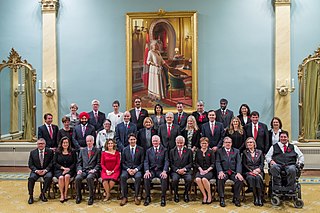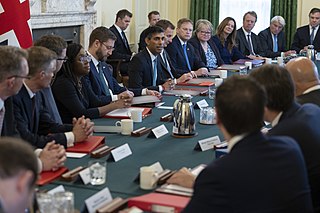The 2022 British cabinet reshuffle can refer to:

Winifred Ann Taylor, Baroness Taylor of Bolton, is a British politician and life peer who served in the Cabinet of the United Kingdom from 1997 to 2001. A member of the Labour Party, she was Member of Parliament (MP) for Bolton West from 1974 to 1983, and Dewsbury from 1987 to 2005.
A cabinet reshuffle or shuffle occurs when a head of government rotates or changes the composition of ministers in their cabinet, or when the Head of State changes the head of government and a number of ministers. They are more common in parliamentary systems than in systems where cabinet heads must be confirmed by a separate legislative body, and occur frequently in autocratic systems without suitable checks-and-balances.

The Minister for the Cabinet Office is a position in the Cabinet Office of the United Kingdom. The minister is responsible for the work and policies of the Cabinet Office, and since February 2022, reports to the Chancellor of the Duchy of Lancaster. The position is currently the third highest ranking minister in the Cabinet Office, after the Prime Minister and the Chancellor of the Duchy of Lancaster.

The Great Offices of State are senior offices in the UK government. They are the prime minister, chancellor of the Exchequer, foreign secretary and home secretary or, alternatively, three of those offices excluding the prime minister.

The Council of Cabinet Ministers is the body of high-ranking Brunei officials, consisting of the top leaders of the executive branch of Brunei government. Led by the Sultan himself, who has also been the Prime Minister of Brunei since 1984.

The Twenty-Ninth Canadian Ministry is the Cabinet, chaired by Prime Minister Justin Trudeau, that began governing Canada shortly before the opening of the 42nd Parliament. The original members were sworn in during a ceremony held at Rideau Hall on November 4, 2015. Those who were not already members of the privy council were sworn into it in the same ceremony. The Cabinet currently consists of 35 members including Trudeau, with 17 women and 18 men. When the ministry was first sworn in, with 15 men and 15 women, it became the first gender-balanced cabinet in Canadian history.

The Saudi Council of Ministers is the cabinet of the Kingdom of Saudi Arabia. It is led by the King. The council consists of the king, the Crown Prince, and cabinet ministers. The Crown Prince is also the Prime minister and Chairman of the Council of Ministers. Since 2015, there are 23 ministers with portfolio and seven ministers of state, two of whom have special responsibilities. All members of the council are appointed by royal decree.

The Second Gillard ministry (Labor) was the 66th ministry of the Australian Government, led by Prime Minister Julia Gillard. It succeeded the first Gillard ministry upon its swearing in by Governor-General Quentin Bryce on 14 September 2010 after the 2010 election.
Ahmed Gamal El Din is a retired police general and Egypt's former minister of interior. He served in the Qandil cabinet.

The Minister of Mineral Resources and Energy is a minister in the cabinet of the South African national government. The portfolio was called the Ministry of Minerals and Energy until May 2009, when President Jacob Zuma split it into two separate portfolios under the Ministry of Mining and the Ministry of Energy. Ten years later, in May 2019, his successor President Cyril Ramaphosa reunited the portfolios as the Ministry of Mineral Resources and Energy.

Theresa May carried out the first reshuffle of her minority government in January 2018. Following the resignation of her deputy, Damian Green as First Secretary of State in December 2017, the reshuffle had been highly anticipated and briefed in the press. There were reports of "up to a quarter" of her cabinet ministers who might lose their positions, including Boris Johnson, who had been seen to cause a number of political gaffes during his term as Foreign Secretary. The reshuffle was seen as an opportunity for May to reassert authority, greatly diminished following the result of the snap general election the previous year. Despite being described by 10 Downing Street as a chance to "refresh" the Cabinet, few changes were made to the ministerial line-up. On 9 January, newspaper headlines reflected the chaotic nature of May's reshuffle, with The Daily Telegraph describing it as, "The Night of the Blunt Stiletto", a reference to the 1962 reshuffle carried out by Harold Macmillan.

The Second Andrews ministry was the 70th ministry of the Government of Victoria. The Labor government, led by Premier Daniel Andrews and Deputy Premier James Merlino, was officially sworn in on 29 November 2018, following the party's second consecutive victory at the 2018 state election, which was held on 24 November 2018.

The second Morrison ministry was the 72nd ministry of the Australian Government. It was led by Prime Minister Scott Morrison. The second Morrison ministry succeeded the first Morrison ministry following the 2019 Australian federal election. The ministry was announced on 26 May 2019 and was sworn in on 29 May. Following the Coalition's defeat at the 2022 election, the ministry was succeeded by the Albanese ministry on 23 May 2022.

The Ministry of Defence is a cabinet-level ministry in the Government of Brunei responsible for the country's national security and military forces, the Royal Brunei Armed Forces (RBAF). It is Brunei's ministry of defence. It was established immediately upon Brunei's independence on 1 January 1984. The current leadership consists of a minister, whereby the incumbent is Hassanal Bolkiah, the Sultan of Brunei and Supreme Commander of RBAF; and a deputy minister. It is headquartered in the capital Bandar Seri Begawan.

The second Johnson ministry began on 16 December 2019, three days after Boris Johnson's audience with Queen Elizabeth II where she invited him to form a new administration following the 2019 general election. The Conservative Party was returned to power with a majority of 80 seats in the House of Commons. Initially the ministers were largely identical to those at the end of the first Johnson ministry, but changed significantly in cabinet reshuffles in February 2020 and September 2021.

Boris Johnson carried out the first significant reshuffle of his majority government on 13 February 2020. Following the December 2019 general election, there was considerable speculation that Johnson was planning a major reshuffle of the Cabinet, to take place after the United Kingdom's official withdrawal from the European Union on 31 January 2020. There were reports that up to a third of the Cabinet would be dismissed, Whitehall departments abolished and civil servants replaced by policy experts; however, the reshuffle was smaller than expected and no departments were abolished. The anticipated reshuffle was nicknamed "The St Valentine's Day Massacre" in the press, due to its proximity to St Valentine's Day, the name being a reference to the 1929 gangland shooting in Chicago.
Adolf Faustine Mkenda is a Tanzanian Minister of Education, Science, and Technology, having previously served as Minister of Agriculture. An associate professor of Economics at the University of Dar es Salaam and a politician who presently serves as a Chama Cha Mapinduzi's Member of Parliament for Rombo constituency since November 2020.

The Second Perrottet ministry or Second Perrottet–Toole ministry was the 99th ministry of the Government of New South Wales, and was led by Dominic Perrottet, the state's 46th Premier.

The Fyles Ministry is the current ministry of the 12th Chief Minister of the Northern Territory, Natasha Fyles. It came into operation on 13 May 2022 and succeeded the Gunner ministry.

The Sunak ministry began on 25 October 2022 when Rishi Sunak was invited by King Charles III to succeed Liz Truss as prime minister of the United Kingdom. Truss resigned as leader of the Conservative Party the previous day after Sunak was elected as her successor. The Sunak ministry was formed from the 2019 Parliament of the United Kingdom, as a Conservative majority government. Sunak has reshuffled his cabinet twice, first in February 2023 and later in November 2023.